At Glowskinhub.com, we believe beauty isn’t just a look—it’s a feeling
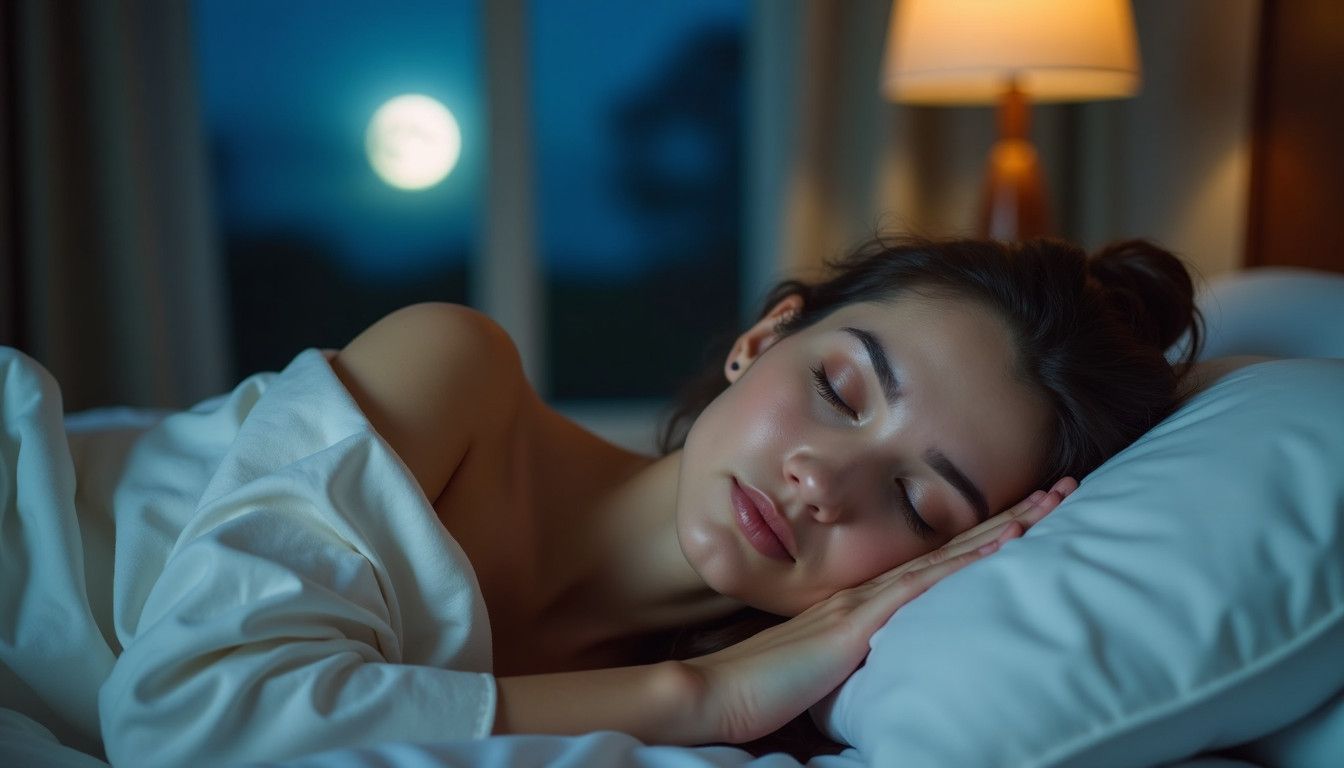
Beauty Sleep Is Real: 9 Powerful Ways Sleep Improves Your Skin
1. Why Sleep Matters for Overall Skin Health
Sleep isn’t just for rest—it’s one of the most powerful Beauty tools we often overlook. During deep sleep stages, your body gets to work repairing, regenerating, and replenishing cells, and this includes your Skin. Think of nighttime rest as your body’s built-in skincare routine.
Cellular Repair in Action
While you snooze, your body increases blood flow to the Skin, delivering nutrients and oxygen that help with cellular turnover. This means your Skin can repair damaged cells caused by environmental stressors like UV rays and pollution.
Boosting Collagen and Elastin
Growth hormone production peaks during deep sleep. This hormone plays a key role in the synthesis of collagen and elastin—two proteins that keep your Skin smooth, firm, and wrinkle-free. Lack of sleep? Collagen production slows down, leading to dullness and fine lines.
Reduced Inflammation and Puffiness
Chronic sleep deprivation triggers systemic inflammation, which can manifest as puffy eyes, redness, breakouts, and even eczema flare-ups. Adequate sleep helps regulate cortisol (your stress hormone), keeping inflammation and irritation in check.
Balanced Skin Hydration
When you’re sleep-deprived, your Skin’s moisture barrier weakens. This can lead to dryness, flakiness, and increased sensitivity. Quality sleep helps maintain optimal hydration levels and keeps the protective lipid barrier strong.
So next time you’re tempted to binge one more episode, remember: those eight hours are your Skin’s best friend.

2. The Science of Sleep and Skin Regeneration
Your Skin isn’t idle while you sleep—it’s in full repair mode. Sleep is when the body enters a parasympathetic state, often referred to as “rest and digest,” and this is crucial for deep, restorative healing.
Circadian Rhythms and Skin Function
Your body runs on an internal clock called the circadian rhythm. This 24-hour cycle doesn’t just affect sleep—it also controls Skin functions like cell division, oil production, and hydration levels. At night, the Skin’s permeability increases, allowing active ingredients (like your serums and masks) to penetrate more deeply. This is why evening skincare routines are so effective.
Peak Repair Hours: 10 PM to 2 AM
Studies show that the most intensive Skin cell regeneration occurs between 10 PM and 2 AM. During this “golden window,” your Skin produces antioxidants to fight damage and increases microcirculation to carry nutrients where they’re needed most.
Melatonin and Skin Healing
Melatonin, your sleep hormone, does more than help you doze off—it’s also a powerful antioxidant. It helps protect Skin cells from free radical damage and supports their regeneration. Poor sleep reduces melatonin production, which can result in a dull, tired-looking complexion.
Collagen Synthesis and Protein Repair
As your body shifts into deeper sleep stages (like REM and slow-wave sleep), it increases production of growth hormone. This hormone triggers protein synthesis required for collagen and elastin—key players in firm, youthful Skin. It also helps heal microtears and sun damage.
Lack of deep sleep? You’ll see it first in the mirror—slower wound healing, sagging, and uneven Skin tone.

3. What Happens to Your Skin When You Don’t Sleep Enough
It’s called “Beauty sleep” for a reason—and when you skip it, your Skin lets you know loud and clear. Consistent sleep deprivation disrupts your body’s natural regeneration processes, leading to visible and often uncomfortable Skin issues.
Dullness and Lack of Glow
One of the first things you’ll notice after a poor night’s sleep is a tired, dull complexion. That’s because your Skin didn’t get the chance to repair damage or receive enough blood flow during the night. Reduced circulation makes your face appear pale, uneven, and less radiant.
Increased Breakouts
Sleep helps regulate hormones—including cortisol, your stress hormone. Without enough rest, cortisol levels rise, leading to increased oil (sebum) production and inflammation. This creates a perfect storm for acne, clogged pores, and Skin flare-ups.
Dehydration and Dryness
Lack of sleep weakens your Skin barrier—the outer layer that retains moisture and protects from environmental aggressors. You may wake up with tight, flaky, or irritated Skin. Over time, this can contribute to fine lines and sensitivity.
Dark Circles and Puffy Eyes
Sleep deprivation affects blood vessels under your eyes, leading to puffiness and dark circles. The lymphatic system also slows down, allowing fluid to pool in this delicate area.
Slower Healing and Premature Aging
With less collagen production and antioxidant defense, your Skin becomes more prone to wrinkles, fine lines, and damage from pollution or UV rays. It also takes longer to heal small cuts, breakouts, or sunburn.
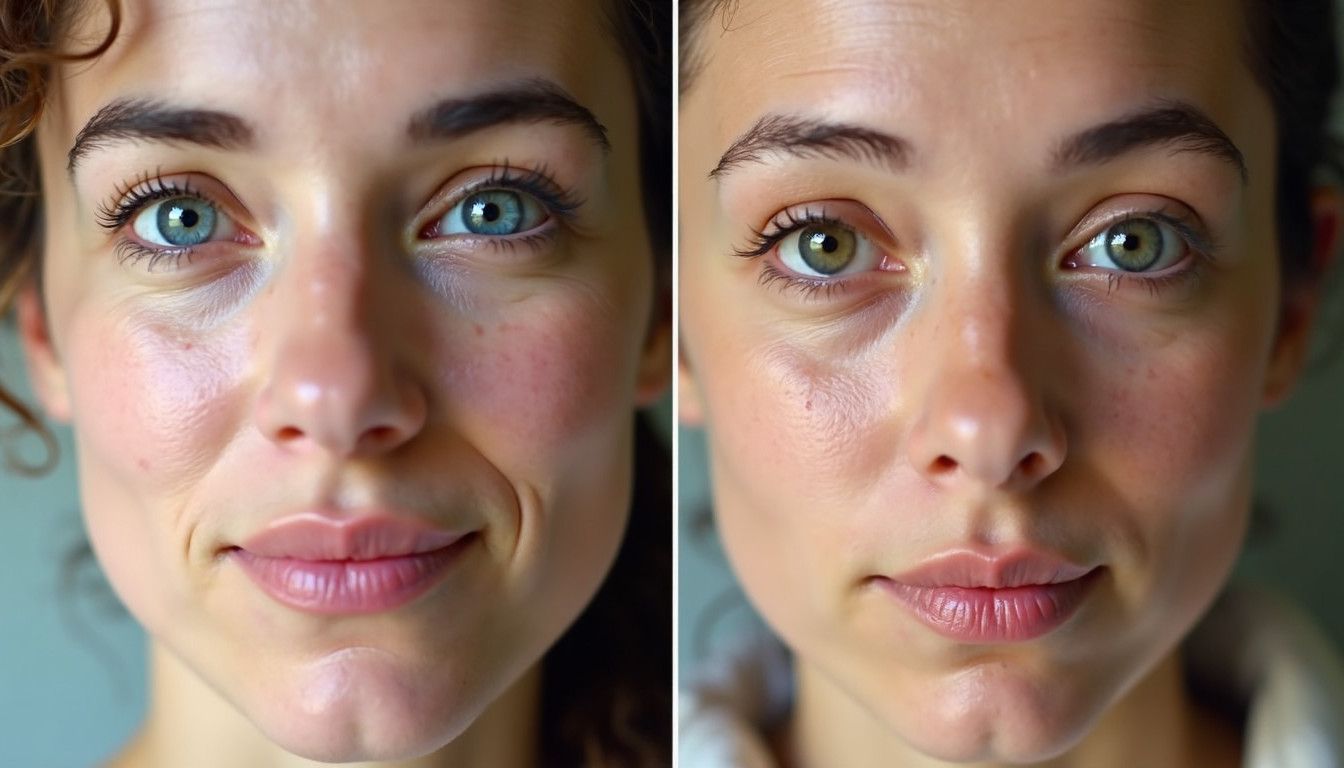
4. Deep Sleep vs. Light Sleep – Why It Matters for Your Skin
Not all sleep is created equal. While your body goes through multiple stages of sleep each night, it’s deep sleep (slow-wave sleep) that plays a crucial role in Skin rejuvenation. If you’re tossing and turning all night in light sleep, your Skin might not get the restoration it desperately needs.
The Power of Deep Sleep
During deep sleep, your body enters a state of full repair. Blood flow to the Skin increases, and essential hormones like human growth hormone (HGH) are released. This hormone is responsible for repairing damaged cells—including Skin cells—and stimulating new tissue growth. Collagen production also kicks into high gear during this stage, helping reduce the appearance of fine lines and improve elasticity.
What Happens in Light Sleep?
Light sleep is important for processing information and setting the stage for deeper stages—but it doesn’t offer the same physical restoration. If your sleep is constantly shallow due to stress, screen exposure, or disruptions, you may not reach enough deep sleep to truly support Skin health.
Why REM Sleep Also Helps
REM sleep, which happens later in the sleep cycle, helps regulate cortisol levels and manage emotional stress—both of which are tied to Skin conditions like acne, eczema, and psoriasis. Skipping REM due to short sleep cycles can lead to increased inflammation.
To truly support glowing, resilient Skin, aim to optimize both deep and REM sleep stages through healthy sleep hygiene each stage.
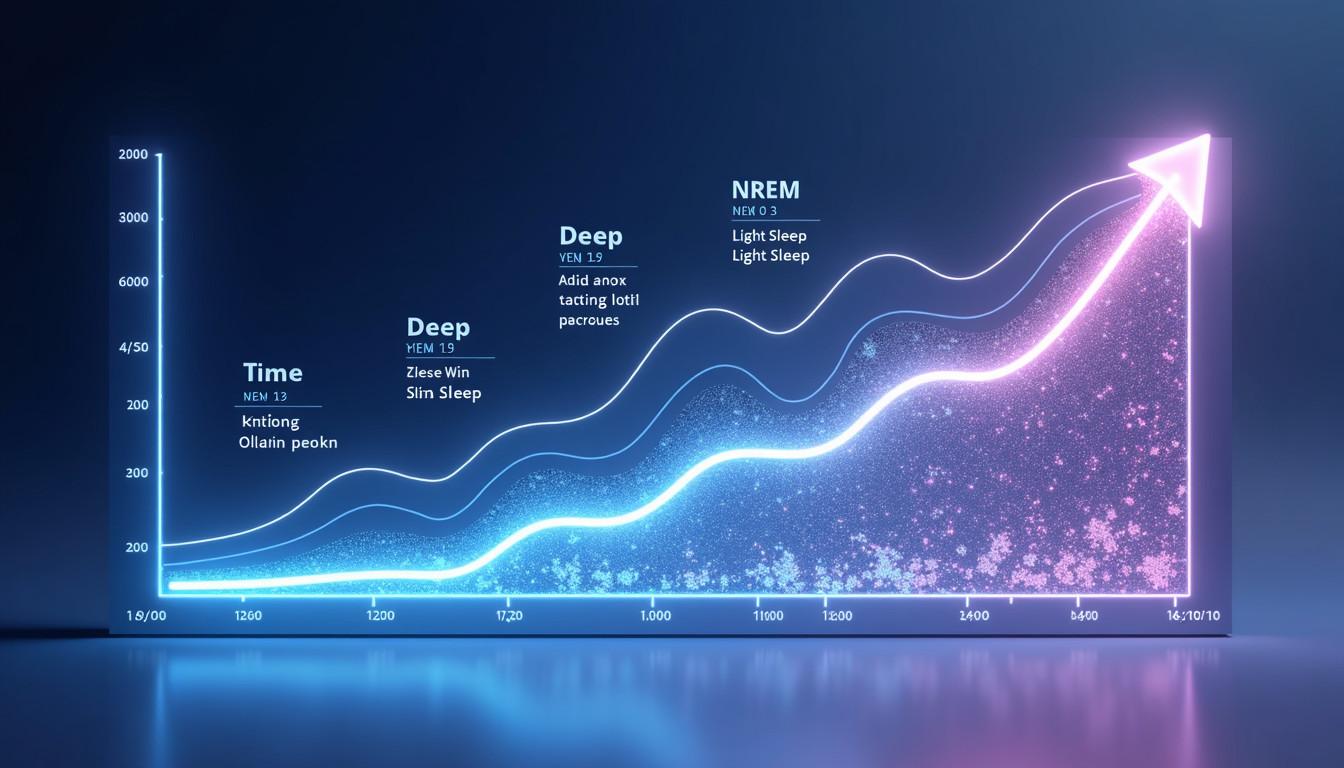
5. Skin Conditions Linked to Poor Sleep
You might think of sleep as a luxury—but for your Skin, it’s a biological necessity. When your sleep suffers, your Skin often sounds the first alarm. Chronic sleep deprivation doesn’t just leave you with under-eye bags; it can exacerbate or even trigger several Skin conditions.
1. Acne and Breakouts
Poor sleep increases levels of cortisol, your body’s stress hormone. Elevated cortisol leads to excess sebum (oil) production, clogged pores, and more frequent breakouts. Add in the fact that poor sleep weakens the immune system, and your Skin struggles to heal existing blemishes.
2. Eczema and Psoriasis
If you’re prone to inflammatory Skin conditions like eczema or psoriasis, lack of sleep can cause flare-ups. Inflammation worsens with disrupted sleep, and the resulting itchiness or discomfort can then make it harder to sleep—creating a frustrating cycle.
3. Skin Sensitivity and Redness
Sleep-deprived Skin often becomes more sensitive. You might notice increased redness, irritation, or even allergic reactions to products you normally tolerate well. This is partly because sleep helps maintain the Skin’s moisture barrier, which prevents environmental irritants from entering.
4. Premature Aging
A tired body doesn’t regenerate collagen as effectively. Over time, fine lines, dullness, and loss of firmness become more apparent. Even one night of poor sleep can reduce circulation, leading to a pale, lifeless complexion.
Taking steps to improve your sleep can offer visible improvements in just a few days—making it one of the most natural and cost-effective ways to boost Skin health.

6. Sleep and Skin Regeneration – What Happens Overnight
Sleep isn’t just rest time for your body—it’s prime time for Skin renewal. During the night, your Skin enters a unique recovery mode that doesn’t occur while you’re awake. Understanding this process can help you better support your Skin from the inside out.
Boosted Cell Turnover
Between 10 PM and 2 AM, your body hits its peak repair cycle. During deep sleep (especially non-REM and REM phases), your Skin cells divide and regenerate more rapidly. Dead Skin cells are replaced with fresh, healthy ones, creating that sought-after morning glow.
Increased Collagen Production
Collagen, the protein responsible for firm, youthful Skin, is produced in higher amounts while you sleep. This process slows with age, but deep, consistent sleep ensures your Skin maintains elasticity, plumpness, and resilience.
Balanced Hydration Levels
At night, your Skin becomes more permeable, which means it’s more receptive to moisturizers and serums. While this allows for better absorption of active ingredients, it also increases transepidermal water loss—so hydrating before bed is crucial.
Stress Hormone Reset
Sleep reduces cortisol levels and boosts melatonin, both of which have antioxidant effects. Melatonin helps fight free radicals, supporting your Skin’s natural defense system. Without quality sleep, this protective process gets disrupted, leaving Skin more vulnerable to damage.
A good night’s sleep is like pressing the reset button for your Skin—restoring vitality, balance, and clarity overnight.
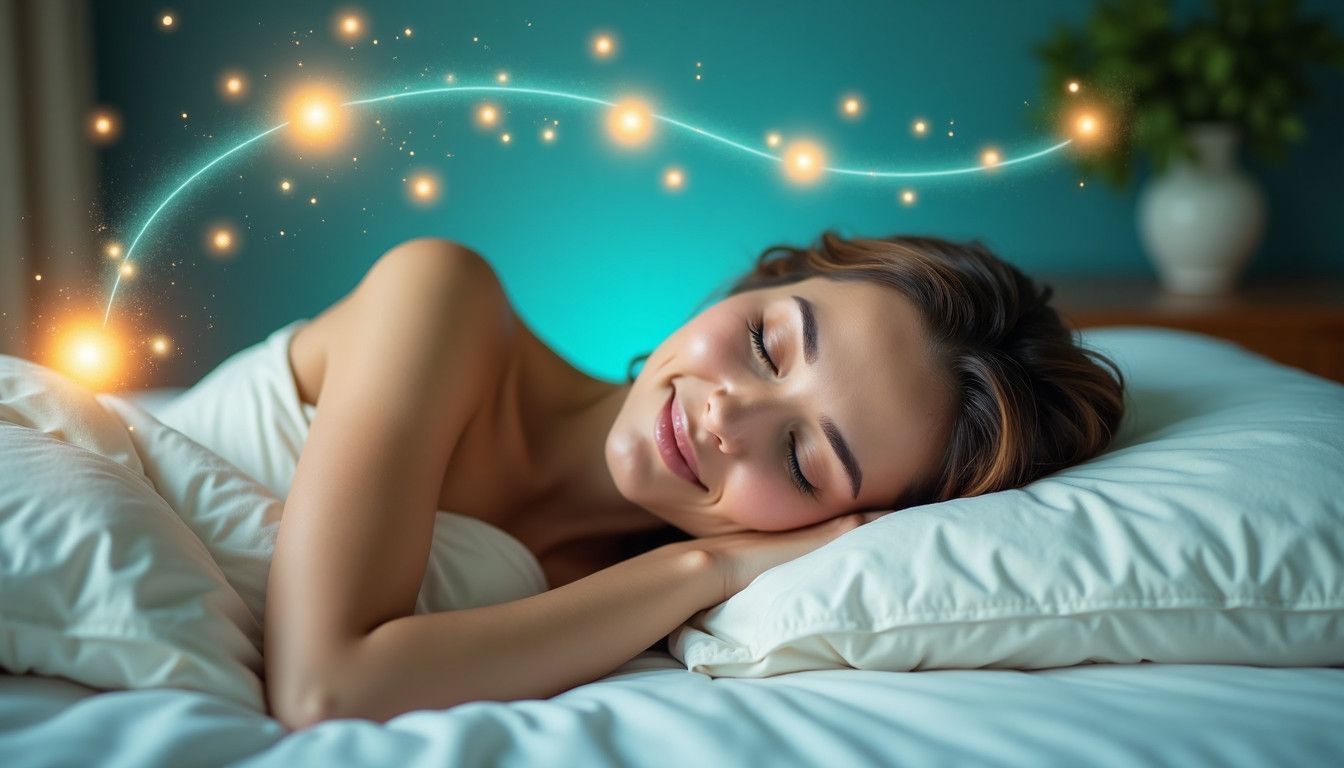
7. How Much Sleep Your Skin Really Needs
While everyone’s sleep needs are slightly different, 7 to 9 hours per night is considered the sweet spot for optimal Skin health. But it’s not just the number of hours that matter—sleep quality plays an equally vital role.
Why 7–9 Hours?
During the night, your body cycles through different stages of sleep: light, deep (non-REM), and REM sleep. It’s in the deep and REM stages that most of your Skin’s repair processes occur. Sleeping fewer than 6 hours consistently means your body might not reach these crucial phases often enough to initiate full recovery.
What Happens When You Undersleep?
- Dullness: Reduced cell turnover makes your complexion look tired and lackluster.
- Dark Circles: Lack of sleep affects blood circulation, causing puffiness and discoloration around the eyes.
- Breakouts: Hormonal imbalance due to sleep deprivation can trigger excess oil production and inflammation.
- Wrinkles: Inadequate sleep slows collagen synthesis and increases cortisol, both of which accelerate aging.
Signs You Need More Sleep
If you notice frequent dryness, irritation, breakouts, or a general lack of glow—even with a solid skincare routine—it might be your body’s way of saying, “I need more rest.”
Aiming for consistent, uninterrupted sleep is just as critical as choosing the right Serum or cleanser. Think of sleep as your Skin’s most powerful, natural Beauty treatment—one that’s completely free.
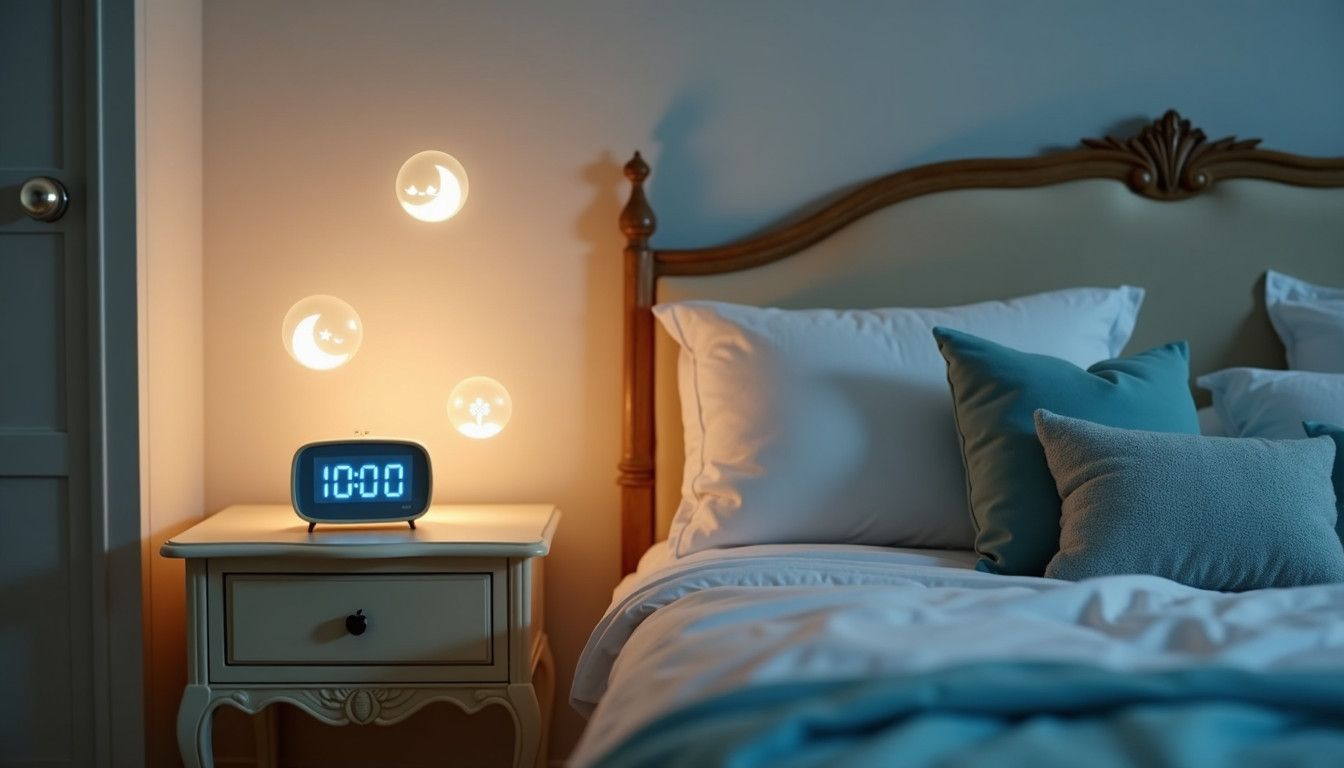
8. Tips for Better Beauty Sleep
Improving your sleep isn’t just about going to bed earlier—it’s about setting up the right environment and routine that tells your body it’s time to rest and repair. Here are practical and proven tips for getting better sleep—and unlocking healthier Skin in the process.
1. Create a Sleep Sanctuary
Your bedroom should be a calm, cool, and dark place. Use blackout curtains, silence notifications, and set your room temperature between 60–67°F (15–19°C). Soft sheets, a supportive pillow, and cozy blankets all contribute to deeper rest.
2. Stick to a Consistent Sleep Schedule
Going to bed and waking up at the same time—even on weekends—helps regulate your circadian rhythm. This consistency supports hormonal balance, which directly impacts your Skin’s hydration and collagen production.
3. Unplug 1 Hour Before Bed
Blue light from phones and screens disrupts melatonin, the sleep hormone. Switch to reading, journaling, or a warm bath instead. Try a “digital sunset”—where you power down all screens by 9:00 PM.
4. Incorporate a Bedtime Ritual
Calming activities like herbal tea (chamomile or lavender), meditation, or light stretching signal your body that it’s time to wind down. You can even add a nighttime skincare routine to double the relaxation and enhance overnight Skin recovery.
5. Avoid Heavy Meals, Caffeine & Alcohol Late in the Day
These disrupt your ability to fall asleep or stay asleep. Aim to finish eating at least 2–3 hours before bed.
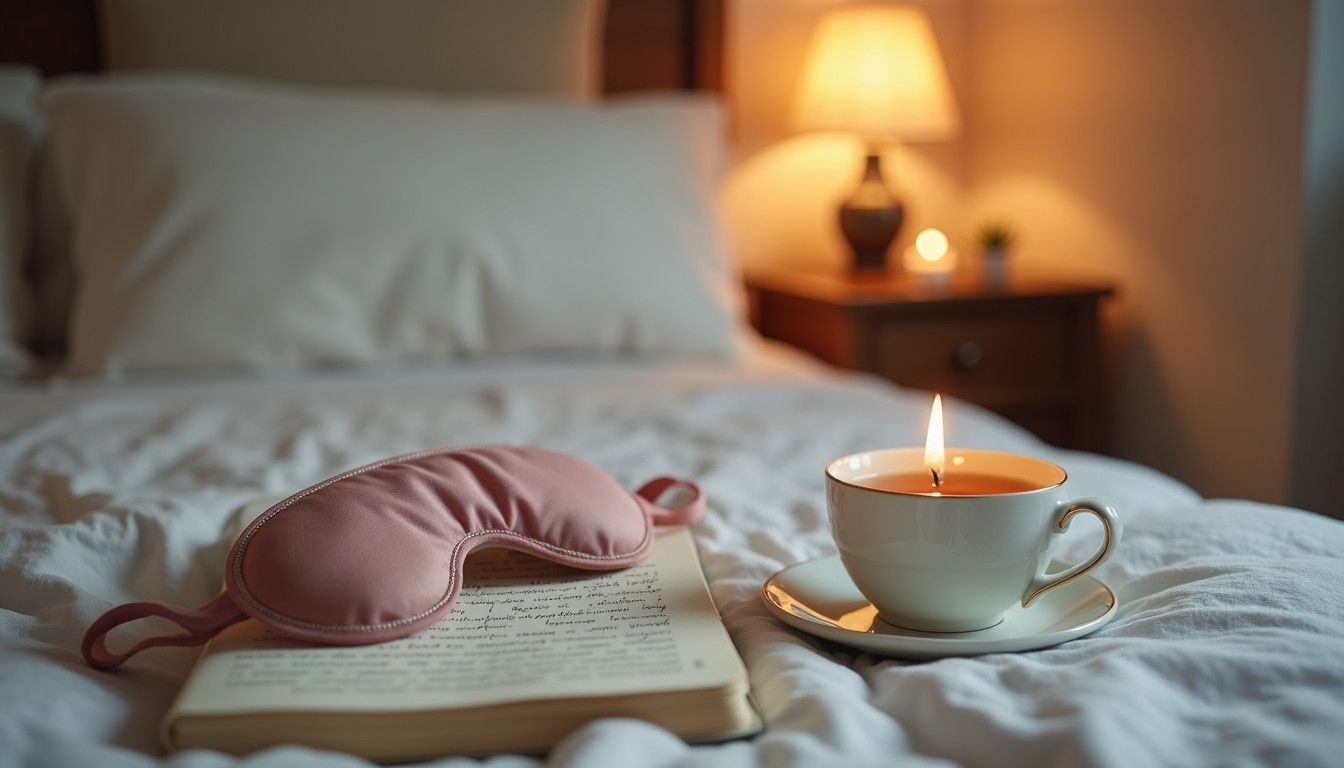
9. Sleep-Friendly Skincare Ingredients
When you sleep, your Skin goes into recovery mode—repairing damage, regenerating cells, and boosting collagen production. The products you apply before bed can either enhance or hinder that process. Here are some of the best ingredients to look for in your nighttime skincare routine:
1. Retinol (Vitamin A)
A powerhouse anti-aging ingredient, retinol stimulates cell turnover and collagen production. Since it can make Skin sensitive to sunlight, nighttime is the perfect time to apply it. Use a gentle formula and start with 2–3 times per week if you’re new to it.
2. Hyaluronic Acid
Hydration is key while you sleep. Hyaluronic acid attracts and retains moisture, helping your Skin stay plump and smooth overnight. Pair it with a nourishing night cream or facial oil.
3. Niacinamide (Vitamin B3)
This multitasker brightens dull Skin, reduces redness, and helps improve Skin barrier function. It also pairs well with other actives and doesn’t cause irritation.
4. Peptides
Peptides are short chains of amino acids that help build collagen and elastin. They support Skin firmness and reduce the appearance of fine lines—especially effective during your body’s nighttime repair cycle.
5. Ceramides
These lipid molecules restore your Skin’s barrier and prevent moisture loss. Ideal for dry or sensitive Skin, they ensure your Skin wakes up soft and nourished.
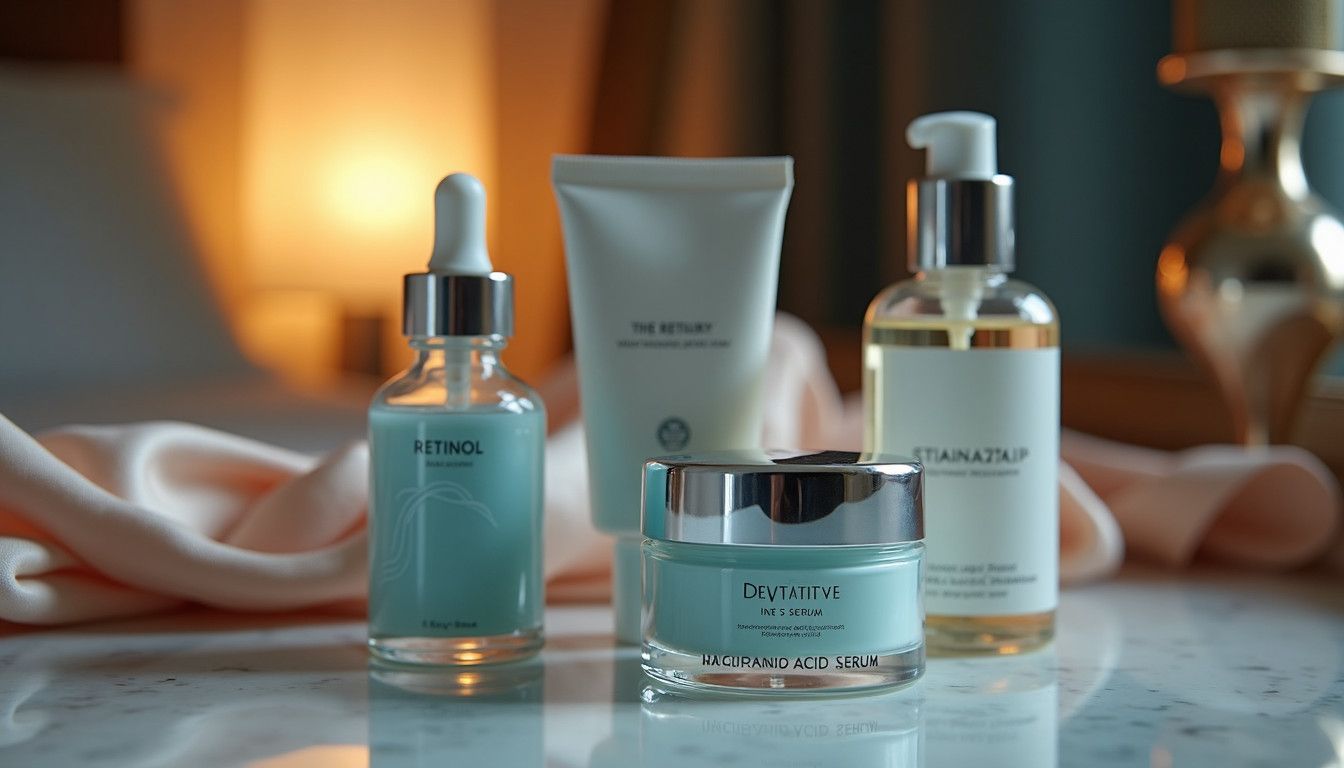
Here are the final sections of your blog post on “Benefits of Sleep and Skin Health” — including the FAQs and Conclusion:
💤 FAQs: Sleep and Skin Health
Q1. Can lack of sleep really cause acne or dull Skin?
Yes. Poor sleep increases cortisol (stress hormone), which can trigger inflammation, oil production, and acne. It also slows cell turnover, leading to a tired and dull complexion.
Q2. What’s the ideal amount of sleep for healthy Skin?
Most dermatologists recommend 7–9 hours of sleep each night. Consistent quality sleep gives your Skin enough time to repair itself and regenerate.
Q3. Should I change my skincare routine if I’m not sleeping well?
Yes. If you’re under stress or not sleeping well, switch to calming, barrier-repair ingredients like niacinamide, ceramides, and hyaluronic acid. Avoid strong actives like retinol until your Skin stabilizes.
Q4. Does sleeping with makeup on ruin your Skin overnight?
Absolutely. Sleeping in makeup clogs pores, traps pollutants, and prevents your Skin from breathing. This leads to breakouts, irritation, and premature aging.
Q5. Do sleep masks or overnight creams really work?
They can be very effective! Overnight products are designed to support your Skin’s natural repair process. Look for hydrating and calming ingredients like peptides, aloe vera, and vitamin E.
🌙 Conclusion: Sleep Your Way to Glowing Skin
Your pillow is more powerful than you think—it’s where your Skin heals, strengthens, and resets. While expensive serums and treatments can help, nothing replaces the power of consistent, high-quality sleep.
When you pair a calming bedtime ritual with nourishing skincare, you set the stage for healthy, glowing Skin. Whether it’s reducing wrinkles, brightening your complexion, or fighting breakouts, a good night’s rest is the foundation of it all.
So tonight, skip the doomscrolling, sip a calming tea, dim the lights, and treat your face to a sleep-loving Serum. Because sometimes, the best Beauty secret isn’t in a jar—it’s in your dreams.





